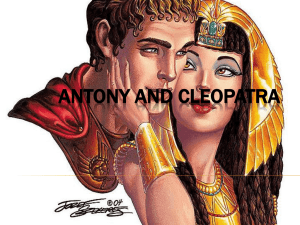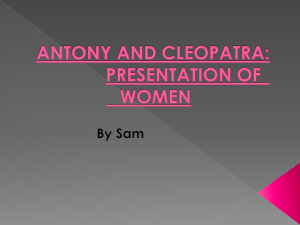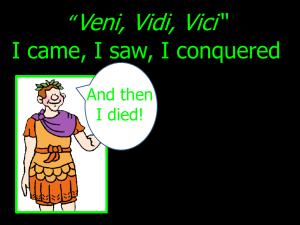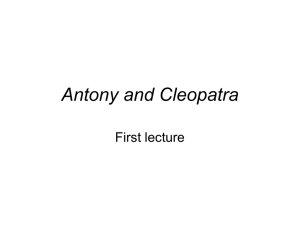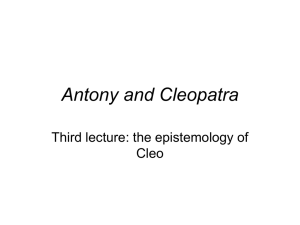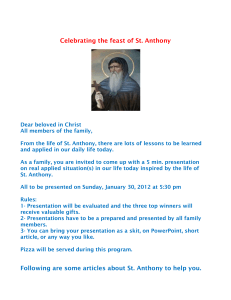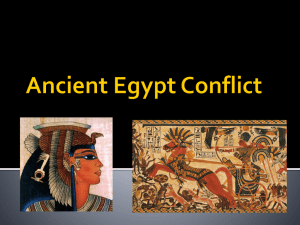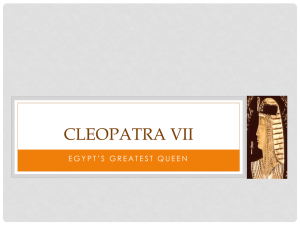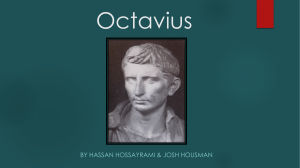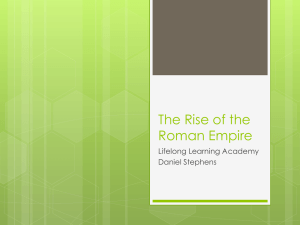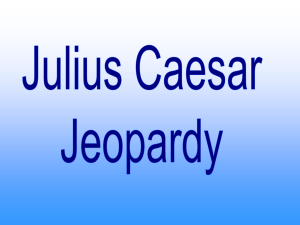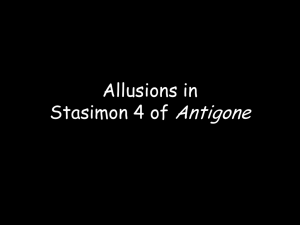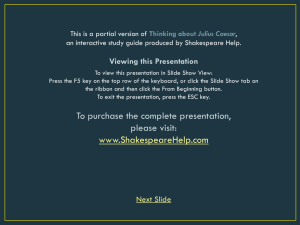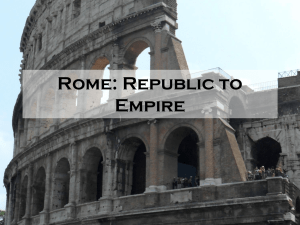Antony`s flaw and tragic downfall.
advertisement
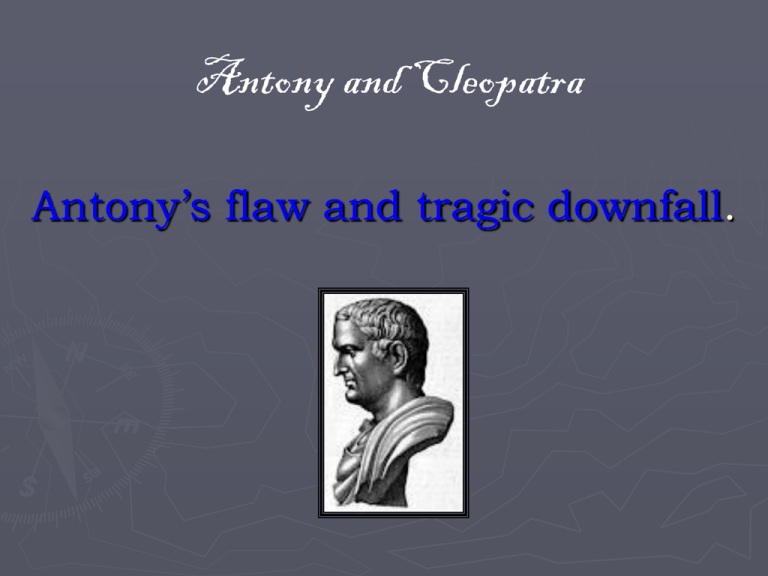
Antony and Cleopatra Antony’s flaw and tragic downfall. Internal Factors External Antony’s Flaw (Act I) ► Antony is a respected and honourable general whose reputation as a great man precedes him but a conflict within himself arises when he arrives in Egypt and falls in love with the Queen, Cleopatra. Antony’s inner conflict is the physical representation of the differences between these two worlds: Rome symbolises war, honour and duty, where military and political power are prized above all else. This contrasts with Egypt where court life is filled with passion and desire; sensuality and love. Antony’s tragic flaw is his desire to be part of these two contrasting, and at times opposing worlds: wanting to retain his power and reputation within Rome as a fearless soldier and magnificent leader but also wishing to live a care-free life with Cleopatra. Exposition ► Exposition: ACT I: Antony’s nobility as well as his flaw introduced through characterisation, setting and language. Theme of duty and honour highlighted through Antony’s conflict: the draw of duty and honour in Rome fighting with passion and freedom. ► Structure of whole act is antithetical (alternates between Rome and Egypt) which emphasises conflict and how Antony is cut between the two. Act 1, Scene 1 Structure, characterisation and language: Philo and Dimitri’s conversation reveals Antony’s past honour and reputation but also his current conflict. Language (antithesis and imagery) highlights central conflict. Language also reveals Roman values and dislike of Egyptian values. They are very critical of his FLAW. ► “The triple pillar of the world transformed into a strumpet’s fool. Behold and see.” (1.1.11-12) “He comes too short of that great property which still should go with Antony.” (1.1.58-59) ► Duty v Passion Messengers used as a device to emphasise conflict (they appear 5 times; Antony never free from pull of duty and Rome; messengers always interrupt relationship with Cleopatra: ‘Let Rome in Tiber melt…The nobleness of life is to do thus.’ (1.1.33) Even in Egypt he is not free. ► But should he be allowed freedom? He is one of the triumvirate. Why should he not be forced to do his duty by Caesar? Act 1, Scene 2 ► ► ► ► Antony learns of a series of difficulties in Rome via the messengers (plot device to heighten drama) – including war waged by his wife and her death. Antony’s inner conflict highlighted when Cleopatra comments: “He was disposed to mirth, but on the sudden A Roman thought has struck him” (1.2.77-78) Antony recognises his “idleness” has caused this and decides, “I must from this enchanting queen break off” (1.2.123) Closing speech of this scene is businesslike and shows political awareness. In contrast with the extravagant language he used when talking to Cleopatra – shows Antony’s political side – decisive and focussed. Extrapolation: Whole Play ► What other key evidence would you offer, drawn from the rest of the play, which would support your line of thought? Tragic Downfall: External Factors ► While it is clear that Antony’s contribution to his own downfall is significant, it should be acknowledged that other contributing factors play an important part too. ► In many ways these external factors mirror Antony's internal conflict, and they do overlap, but it is fair to say that in their own right, they contribute to Antony's tragic demise. Tragic Downfall: External Factors ► Characterisation Cleopatra Octavius Caesar ► Setting Egypt Rome ► Theme Fate/Destiny Cleopatra ► “infinite variety” She is constantly changing; an unreliable ally in wartime. ► She is manipulative ► She is enchanting: imagery suggests he is bewitched; it is out of his control. ► Find at least 3 examples from across the text to support this viewpoint. Caesar ► The time of universal peace is near. ► Intent of world domination and sees Antony as a threat. Young and determined where Antony is old and forgiving. ► ► Find at least 3 pieces of evidence from across the text to support these assertions. Setting ► ► ► ► ► Rome an extreme culture where duty is everything. Empire and expansion are the main goals of Roman leaders at this point in history. Antony cannot escape this. Egypt is the country of Cleopatra: passionate, wilful, seductive. Antony cannot escape this either. Make sure that you have at least 3 pieces of evidence from across the text to support the significance of each of these settings to Antony, and to support the view that this conflict contributes to his downfall. Destiny ► ► ► Fate. Downfall foreshadowed by soothsayer. A device to show events are out of Antony’s control. History acts as fate: the audience know the outcome. It is inevitable that Caesar will win so any attempts to overcome the problems is futile. Act 2, Scene 3 – Soothsayer advises Antony to leave Rome and go back to Egypt. Soothsayer to Antony in reference to Caesar – “Thy lustre thickens, when he shines by” (2.3.278) – Your light dulls when he is near. Characteristics of a Tragic Hero: Noble Birth ► Usually of noble birth: he is usually a king, a leader of men - his fate affects the welfare of a whole nation or number of people. Peasants do not inspire pity and fear as great men do. The sudden fall from greatness to nothing provides a sense of contrast. ► This works equally for Cleopatra, a queen and ruler, upon whose position her entire nation depends. Antony’s Demise ► ► ► ► ► ► ► Act IV (10, 11, 12) Covers the final battle and Cleopatra’s desertion and “betrayal’”for the second time. N.B. Antony’s pride: ”I would they’d fight in i’the’fire or i’th’air; We’d fight there too.” (4.10.98-9) foreshadowing his downfall. Flaws: Quick to believe the worst of Cleopatra (scene 12) without any proof of why her ships left. Believes she intends to go to Caesar and become his lover. Quickly resorts to sexist Roman language. Flies into a lover’s rage when he sees her then falls into self-pity rather than continuing to fight/lead his army. Antony’s Demise ► Act IV (14) Antony’s suicide ► Dramatic Irony: We know Cleopatra is still alive. How does this affect our sense of pity? ► Has he learned a lesson? Is he dying for honour or love or saving face? ► Antony’s Demise ► Act IV (15) ► BUT Tragic: So forgiving of Cleopatra. Last words are for her to save herself and seek a deal with Caesar: ”Of Caesar seek your honour with your safety.” Does his forgiveness suggest he does recognise his own part in his downfall and acceptance of responsibility for his own flaws? OR is it evidence he is weak and too forgiving. ► ► Compare and contrast with Cleopatra's demise… Cleopatra’s Demise Act IV (13/14) ► Cleopatra: Immature, manipulative, lacks foresight of the consequences of her actions. ► BUT: ► Realises error and redeems herself – self-awareness. ► ► ► ► Act V Her manner of death – Beauty preserved Escaping Octavius and his plans Joining Mark Antony in the afterlife Weak or courageous? Resolution ► “The meaning of Antony’s death hinges on Cleopatra’s response to it.” (Shapiro) ► The audience experience emotional release – catharsis. Antony’s death forces Cleopatra to develop into someone worth of admiration and Antony’s devotion. ► She stays true to herself (and Antony) by refusing to become Caesar’s trophy. Sacrifices her life to maintain her honour. ► Bride and bridegroom references – love conquers over Roman politics and duty – can finally be together as husband and wife in death.
